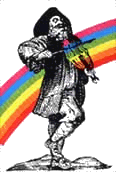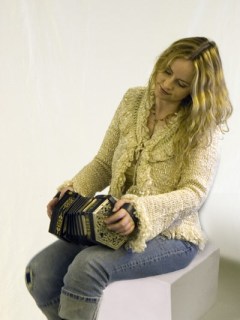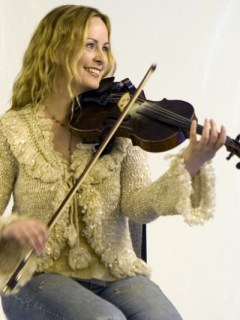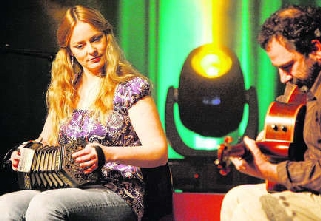
www.irishfolkfestival.de |
Súgach Sámh
Niamh Ní Charra is ... Happy Out
FolkWorld Issue 43 11/2010; Article by Petr Pandula

www.irishfolkfestival.de |
Súgach Sámh
Niamh Ní Charra is ... Happy Out
Magnetic Music's Petr Pandula talked to Irish fiddle and concertina player Niamh Ní Charra about promoting her new album "Súgach Sámh - Happy Out" and the current Irish Folk Festival tour on the continent.
 Niamh Ní Charra @ FolkWorld:
|
Niamh, when calling you on your mobile, I'm gobsmacked. Your answer is in Gaelic and I don't understand a single word. Then comes the English translation. It is the same with your album. Why?
Yes. This might seem strange to a foreigner, just as it would be strange for me to expect a message in English when ringing France for example. However, it would be just as strange for me not to have a bi-lingual message on my phone. People from abroad forget that Ireland is a bi-lingual country, (you see it on our road signs, for example), but also for a small percentage, Irish is actually their first language. Gaeltacht areas (areas where Irish is spoken as a first language), are found in particular all down the west coast. There are no less than 3 such areas within 30 minutes (West, South West and East) of where I was born. I was brought up speaking both languages.
However, from the point of view of the album, this is not the only link. The Irish language is inextricably linked to our traditional music. On my album, for example, I sing three songs, two of which are in Irish. To sing these in English would make no sense. Unlike pop or classical music, folk music is linked to the language and the culture of a place and therefore the language can not be forgotten. To be a true exponent of Irish music, in my opinion, you need to at the very least understand and accept the importance of our national language, which is, after all, one of the oldest in Europe – older even than Latin!
You're singing, playing fiddle and concertina. When you study a new piece, how do you decide if playing it on one instrument or the other?
Naturally I would learn a piece on both instruments, but often the swing of the tune, the in-built feeling, will tell me which I should use. In general I prefer reels on the fiddle and hornpipes on the concertina, for example. My style and mood on each instrument is different. With the concertina I have a gentler more delicate style, while my fiddle is all fire! That said, I can play fiery polkas on the concertina and a gentle lament on the fiddle, just as easily!
On "Happy Out" you're romping all over the place. There is a lot from the Irish traditon, but also a waltz from Bohemia and tunes from Galicia, Britanny and Cape Breton. How come?
Two reasons. Firstly, as a professional musician, I have spent the last 15 years travelling all over the world and have gathered these tunes along the way. Folk music all over the world has one thing in common – it is the peoples’ music, so when you come across a lovely tune from another tradition it can grab you just as much as one from home.
 Secondly the music itself has travelled for hundreds of years, with the emigrants. Some of the tunes on my album for example travelled over to America in the 18 / 19th centuries with the emigrants and survived in their new adopted country but were forgotten at home. Or tunes were composed by the emigrants while in their new land and would never have been heard at home. But these are still very much part of the tradition.
Secondly the music itself has travelled for hundreds of years, with the emigrants. Some of the tunes on my album for example travelled over to America in the 18 / 19th centuries with the emigrants and survived in their new adopted country but were forgotten at home. Or tunes were composed by the emigrants while in their new land and would never have been heard at home. But these are still very much part of the tradition.
You're playing with the Carlos Núñez Band for three years now, and you also form a duo with Basque musician Ibon Koteron. So you being a lot in Spain and all over the world. How did this change or expand your musical horizon?
As I mentioned, folk music all over the world, is the peoples’ music. It has a life and energy unique to that area. As a musician who travels the world, there is nothing I like more than to listen to and collect these tunes, or musical memories, if you like. I think, not only does it widen your repertoire but it puts your own tunes in an important and wider context, and you appreciate more the tradition behind them.
Your uncle Patrick played the Irish Folk Festival more than 30 years ago, so you're the second generation of your family participating. How does that feel?
Wow! What an honour. Irish Traditional music is such an aural and oral tradition. To have it passed down is fantastic, but to have it handed down within a family is truly special. For me, not only did my father and uncle play, but my grandmother sang, mostly in Irish, and those are the songs I now sing. But Irish music has a tradition of travelling, just like its people. So this travel is also part of our culture. To play in a festival abroad, where my uncle (who passed away 2 years ago, which makes it even more special) also played, is indeed a special priviledge. It’s like the ghosts of musicians past are always with us!
 What are the differences in performing in Ireland or Germany?
What are the differences in performing in Ireland or Germany?
For me I think concerts in Ireland are more music based, more instrumental. Concerts in Germany are much more about the singing. But for me where I come from especially, dancing is the most important thing. It is part of our social fabric. There is an expression in Irish “Ceol gan damhsa, níl ann ach glór” which translates as “Music without dancing is just noise”!! So you see, our concerts at home are all about playing dance music. The songs are just to give the musicians and dancers a break!
What do you like about Germany in particular?
Germans have a great understanding and appreciation for tradition. I can sing a song in Irish, in Germany and while they won’t understand , they will get the general message and they really do appreciate the song’s history and tradition. They understand that the language and feelings described are hundreds if not thousands of years old. In the anglo world eg England and America, there isn’t the same appreciation, I don’t think. People in English speaking countries (especially those where English is the only language spoken) tend to be spoiled and don’t make the effort to understand songs in other languages. In Germany, where people are used to listening to other languages, they can appreciate the songs better.
Photo Credits:
(1) Irish Folk Festival Logo
(by Magnetic Music);
Niamh Ní Charra:
(2)-(3) Promo shots (by James Goulden, AAA Photography),
(4) Irish Folk Festival 2008 ft. Alan Colfer (unknown).
|
To the German FolkWorld |
© The Mollis - Editors of FolkWorld; Published 11/2010
All material published in FolkWorld is © The Author via FolkWorld. Storage for private use is allowed and welcome. Reviews and extracts of up to 200 words may be freely quoted and reproduced, if source and author are acknowledged. For any other reproduction please ask the Editors for permission. Although any external links from FolkWorld are chosen with greatest care, FolkWorld and its editors do not take any responsibility for the content of the linked external websites.
